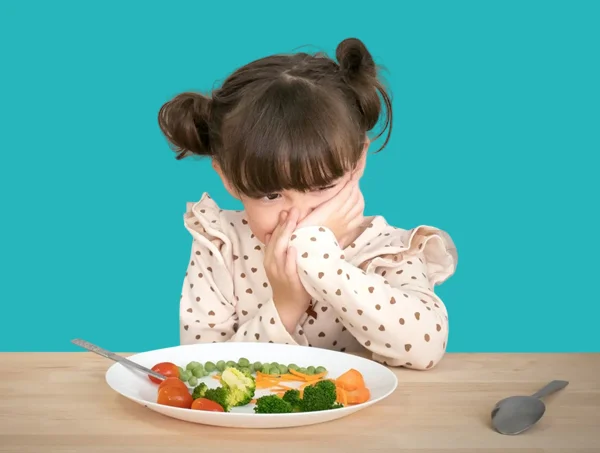Constipation in children occurs for various reasons, including unhealthy eating habits, insufficient water intake, or a lack of fiber in the diet. It is often temporary.
Although constipation is not a serious health problem, early diagnosis and treatment are essential to avoid potential complications, which we will explore in this article.
What is constipation in children
Constipation in children is defined as a decrease in the frequency of bowel movements (less than 3 times per week), or when the stool becomes hard and dry, and the bowel movement is painful for the child.
Causes of constipation in children

Constipation can be temporary or chronic in children, depending on the cause, including:
- Lack of physical activity.
- Stress or psychological pressure.
- Thyroid disorders.
- Digestive disorders.
- Delayed bowel movements.
- Obstruction or impaired bowel movements.
- Lack of fruit and vegetable intake and lack of water intake.
- Transitioning from breastfeeding to solid foods for infants.
What are the symptoms of constipation in children
Symptoms of constipation in children include:
- Loss of appetite.
- Abdominal pain and bloating.
- Pain and difficulty during bowel movements.
- Hard, dry stools.
- Defecation less than three times a week.
- The child may strain to defecate, and blood may be present during or after bowel movements.
- Feces may be present on the underwear due to prolonged retention.
Diagnosing Constipation in Children
Diagnosing constipation in children is based on observing the symptoms. The doctor begins by asking the parents about the child's bowel movements and their usual diet.
The doctor then examines the child to check for abdominal bloating or a mass of accumulated stool. He or she may order some tests and examinations to ensure there is no organic cause, such as intestinal obstruction.
Diagnosis helps determine the type of constipation, determine the appropriate treatment for the child, and avoid any serious complications.
Complications of Constipation in Children If Untreated
Although some causes of constipation in children are temporary and resolve with the removal of the cause, neglecting diagnosis and treatment can lead to serious complications, such as:
- Fecal leakage.
- Chronic abdominal pain.
- The child's fear of defecation.
- Intestinal or rectal swelling.
- Anal fissure.
- Loss of appetite and poor growth.
Methods for Treating Constipation in Children

There are several ways to treat constipation in children, depending on the cause, severity, and age of the constipation. These include:
- Drinking plenty of water and fluids.
- Using laxatives under the supervision of a doctor.
- Increasing the intake of fiber-rich fruits and vegetables.
- Encouraging the child to move and engage in physical activity.
- Using enemas to empty the bowels under the supervision of a doctor.
- Encouraging the child to go to the bathroom daily after meals, even if they don't feel like it.
How to Treat Constipation in Children at Home
Most simple cases of constipation in children can be treated at home naturally by:
- Do not scold your child if they cannot defecate.
- Avoid foods that cause constipation, such as fried foods and dairy.
- Encourage your child to drink water regularly and offer them juices.
- Offer meals that primarily contain vegetables and fruits.
- Constantly massage your child's abdomen to stimulate bowel movements and relieve bloating.
- Getting your child used to using the toilet by setting regular toilet times.
Appropriate Diet for Children During Constipation
It is recommended to follow a diet rich in fiber and fluids to stimulate bowel movements during constipation in children and facilitate bowel movements.
This can be achieved by eating vegetables such as spinach, zucchini, and lettuce, and fruits such as apples, pears, and figs, and replacing any white bread with whole-wheat bread.
Offer unsweetened natural juices such as pineapple, orange, and plum juice. Conversely, avoid fatty and fried foods and whole milk.
How can you prevent constipation in your child
To prevent constipation in children, it is best to follow the following habits:
- Do not ignore the child's urge to defecate.
- Follow a healthy, fiber-rich diet.
- Encourage your child to play and move around daily.
- Reduce the consumption of sweets and unhealthy foods.
- Establish a routine for bathroom visits.
- Ensure fluids and water are consumed regularly and avoid carbonated drinks.
Article Summary
Constipation in children is a common condition and is often caused by an unhealthy, low-fiber diet and insufficient water and fluid intake.
Symptoms in children include pain, difficulty defecating, and abdominal pain. These symptoms should not be ignored, and prompt treatment and a correct diagnosis of the cause of constipation are essential.
This is to avoid any serious complications that may occur in the child. A healthy diet should be followed to prevent recurrence of constipation and maintain a healthy lifestyle for the child.